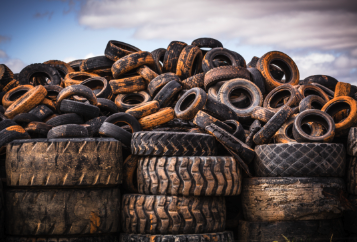
As the leaders in worldwide tyre sealant technology, we at OKO Global are acutely aware of the end-of-life problem that afflicts all tyre makers and users.
Environmental regulations have been toughened in recent years and have gradually lessened the potential uses of worn-out tyres. For example, all-weather sports pitches are no longer allowed to use recycled tyre material, in many countries.
A new article in TyrePress quotes data from the Tyre Recovery Association (TRA), with shocking data and conclusions.
Every year, the UK exports 250-300,000 tonnes of end-of-life tyres: yet domestic recycling capacity of at least 150,000 tonnes is lying idle. These exports travel mostly by sea, and they travel very far, especially (at the time of writing) the very long way around Africa due to Red Sea attacks on shipping – for their destination is usually the Indian sub-continent: a staggering 75% of British tyre waste ends up there, according to UK Government data. This is surely creating a huge, and totally anti-environmental, carbon footprint.
Once the tyres are there, the Indian Government struggles to fight the prohibited and dangerous back-street ‘pyrolysis plants’ that belch out noxious smoke and are incredibly bad for workers and the local environment.
As the TRA report states, what it describes as ‘the UK’s carbon leakage’ should be stopped. But what else can be done?
OKO makes anti-puncture tyre sealants; and in addition to the benefit of sealing punctures and thus extending the life of the affected tyre, we know (from carrying out documented tests on matched vehicles) that we reduce tyre wear by at least 20% (and up to 50% in steer tyres). How? By forming a liquid internal layer that seals the porous tyre tread, OKO helps maintain the correct air pressure, reduces the tyre temperature and keeps the rubber supple for longer. We submitted our operation to an external assessment by Intertek and were pronounced extremely ‘carbon negative’, because the CO2 saving through our extension of tyre life far exceeds the CO2 we generate in our whole operation.
If tyre users, particularly those with fleets of on and off-road commercial vehicles, were to adopt a pro-tyre sealant fitment policy to all new tyres, their CO2 footprint would be substantially lowered (and they would save a huge sum on tyre replacements). This applies across the World, of course. In the case of the UK, what the TRA calls ‘responsible recycling’ could be overlaid on this net reduction in the number of tyres that go into the waste mountain.

